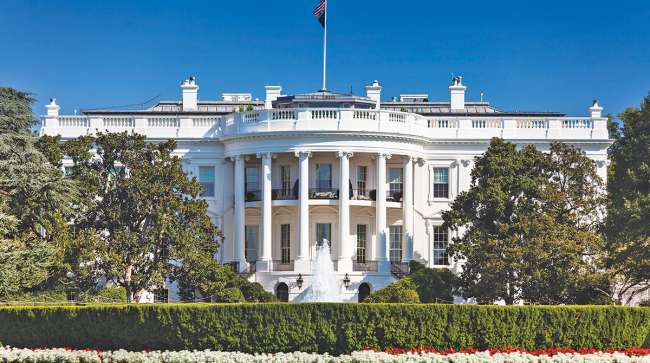Senior Reporter
White House to Release Budget March 9

[Stay on top of transportation news: Get TTNews in your inbox.]
Funding proposals for freight and commuter transportation programs will be unveiled as part of a larger budget plan on March 9, the White House announced recently.
President Joe Biden’s upcoming fiscal 2024 budget request to Congress will seek funds for the administration’s infrastructure portfolio, which includes the ongoing implementation of the $1.2 trillion infrastructure law.
Tucked in the bipartisan Infrastructure Investment and Jobs Act of 2021 are programs specific to freight connectivity, the trucking workforce and the electrification of mobility corridors.
Per background the White House provided on Feb. 6, the president’s budget “will build on the historic economic progress of the past two years by continuing to invest in America and its people, continuing to lower costs for families — from child care to housing to college to health care — protecting and strengthening Social Security and Medicare, and reducing the deficit through additional reforms to ensure the wealthy and largest corporations pay their fair share.”

Host Seth Clevenger speaks with autonomous vehicle pioneer Don Burnette about the pros and cons of driverless cars and trucks. Hear the program above and at RoadSigns.TTNews.com.
Third of a three-part series on autonomous vehicles. Hear Part I here, and Part II here.
Specific to infrastructure funding policies, the White House indicated, “The president’s economic plan is stimulating new factories and manufacturing lines and creating good-paying jobs that don’t require a four-year degree.”
The plan, “includes the most significant upgrade to our nation’s infrastructure in generations,” the White House said.
Biden previewed aspects of his fiscal 2024 budget request during his State of the Union on Feb. 7. As he put it, “On my watch, American roads, bridges and American highways are going to be made with American products.”
Speaking to reporters the day after the State of the Union, press secretary Karine Jean-Pierre said of Biden, “He’s going to put his budget forward on March 9 and lay out … how he believes the next two years should go as it relates to fiscal responsibility.”
In anticipation of the president’s budget request, Congressional Democratic leaders already have signaled they would endorse many of Biden’s proposals.
“The president’s vision for the future will ensure we build on the progress we’ve made by investing in our nation’s greatest resource: the American people,” said Brendan Boyle, ranking member of the House Budget Committee on Feb. 7. “With pro-growth investments that shrink deficits and costs for families, and commonsense reforms to ensure billionaires and corporations pay their fair share, President Biden underscored Democrats’ commitment to building an economy that works for everyone — not just the wealthy and well-connected.”
Top Republicans, meanwhile, have criticized elements of Biden’s agenda. During the president’s tenure, the congressional GOP has highlighted pressure points across the economic landscape. A Republican push on Capitol Hill for expanding oversight of the administration is ongoing.
“We certainly have more government, more spending, and more debt, but less freedom, security and economic certainty than we’ve had in modern history,” House Budget Committee Chairman Jodey Arrington (R-Texas) said Feb. 7. “I believe Americans are strong and our nation is resilient, but the state of the union under President Biden has become weaker and more fragile than I ever imagined.”
“It’s the first Monday in February and the White House has produced no budget,” said Sen. Chuck Grassley (R-Iowa), ranking member of the Senate Budget Committee, on Feb. 6.

Grassley
“After two years of abusing the budget process to pursue reckless, partisan spending, we should not be surprised at what has become typical irresponsibility. But that does not mean we should let it slide,” the senator added. “Households have to budget, so should the government.”
Last week, Biden and House Speaker Kevin McCarthy (R-Calif.) discussed budgetary affairs as part of negotiations related to a debt limit increase. Raising the federal borrowing authority is a requisite prior to the summer. Last month, Treasury Secretary Janet Yellen informed the speaker the department undertook “extraordinary measures” for the country to avoid defaulting on certain obligations.
“While Treasury is not currently able to provide an estimate of how long extraordinary measures will enable us to continue to pay the government’s obligations, it is unlikely that cash and extraordinary measures will be exhausted before early June,” Yellen wrote on Jan. 13.
Want more news? Listen to today's daily briefing below or go here for more info:




